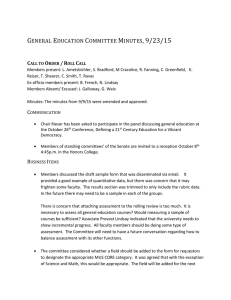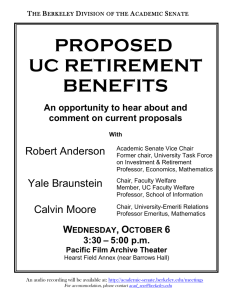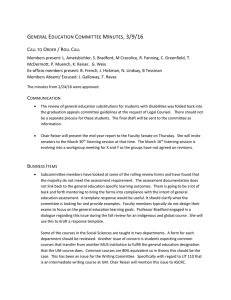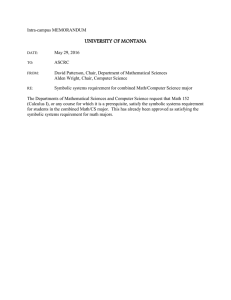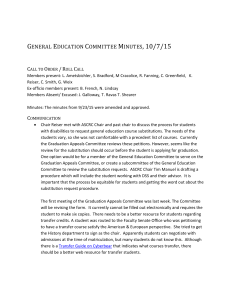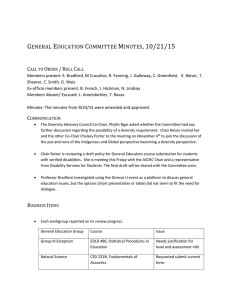G E C M
advertisement
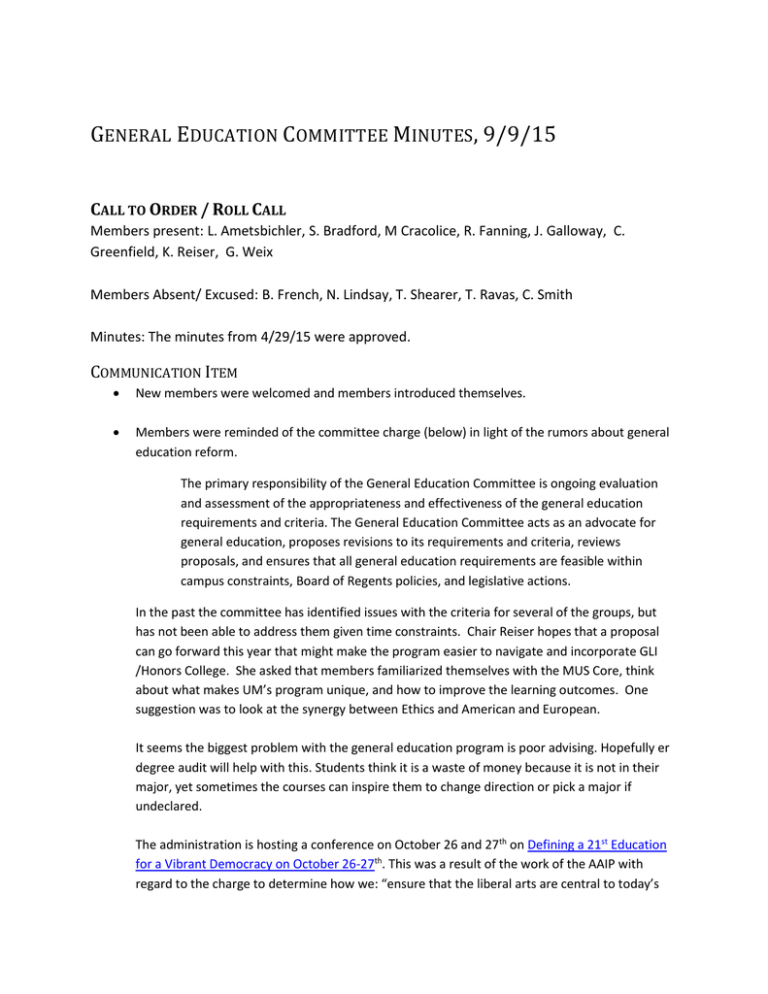
GENERAL EDUCATION COMMITTEE MINUTES, 9/9/15 CALL TO ORDER / ROLL CALL Members present: L. Ametsbichler, S. Bradford, M Cracolice, R. Fanning, J. Galloway, C. Greenfield, K. Reiser, G. Weix Members Absent/ Excused: B. French, N. Lindsay, T. Shearer, T. Ravas, C. Smith Minutes: The minutes from 4/29/15 were approved. COMMUNICATION ITEM New members were welcomed and members introduced themselves. Members were reminded of the committee charge (below) in light of the rumors about general education reform. The primary responsibility of the General Education Committee is ongoing evaluation and assessment of the appropriateness and effectiveness of the general education requirements and criteria. The General Education Committee acts as an advocate for general education, proposes revisions to its requirements and criteria, reviews proposals, and ensures that all general education requirements are feasible within campus constraints, Board of Regents policies, and legislative actions. In the past the committee has identified issues with the criteria for several of the groups, but has not been able to address them given time constraints. Chair Reiser hopes that a proposal can go forward this year that might make the program easier to navigate and incorporate GLI /Honors College. She asked that members familiarized themselves with the MUS Core, think about what makes UM’s program unique, and how to improve the learning outcomes. One suggestion was to look at the synergy between Ethics and American and European. It seems the biggest problem with the general education program is poor advising. Hopefully er degree audit will help with this. Students think it is a waste of money because it is not in their major, yet sometimes the courses can inspire them to change direction or pick a major if undeclared. The administration is hosting a conference on October 26 and 27th on Defining a 21st Education for a Vibrant Democracy on October 26-27th. This was a result of the work of the AAIP with regard to the charge to determine how we: “ensure that the liberal arts are central to today’s higher education and how should we communicate the importance of the liberal arts to prospective students, parents, teachers, and the general public”. Professor Ametsbichler is on the planning committee for the conference. The panelists have not yet been chosen. It is hoped that the General Education Committee would be included in the discussion. The curriculum deadline is October 2nd. When the proposals are in, members will volunteer to serve and or chair the subcommittees that best fit their expertise. The Chair serves as the spokesperson for the subcommittee and will communicate with requesters if necessary. The perspectives scheduled for rolling review in the spring are Ethics, Expressive Arts, and Social Science. The Committee voted to retain this sequence rather than switch Social Science with Historical and Cultural Studies because Social Science Writing Courses are being reviewed this fall. BUSINESS ITEM Discussion of whether the form should include a section for instructors to request a corresponding MUS Core category was postponed. The way this is determined seems to be somewhat nebulous at this time, given some of UM’s perspectives could fit within several of the core categories. Although the forms were revised significantly last year there is not a sample to assist faculty in completing them. Chair Reiser is working on a sample form using the assessment information from Professor Chracolice’s CHEM 141 course, which was included in the assessment pilot last year. The Committee briefly discussed whether workshops should be offered. Given that the curriculum deadline includes language for faculty to contact Associate Provost Lindsay for help on the assessment section. He might be able to determine whether there would be interest in a workshop. It is unlikely faculty would attend without an incentive or requirement. A workshop for the next group of pilot courses may be a better use of time, given much of the assessment section for new courses is optional. Members will monitor the forms for areas where guidance may be needed. This year the assessment pilot will be extended to Ethics and Math. Chair Reiser asked for the committee to identify possible courses/ instructors to include. A request to accept the honors version of calculous as a symbolic systems course was approved. The Mathematics department unfortunately forgot to submit the course last (which has a different number (M181) fall. The omission was brought to their attention because the course was left off several majors lists of courses that could satisfy the symbolic systems exemption. The request also asked that the course be added to these sequences without requiring additional paperwork. These include Biology, Chemistry, Geoscience, Mathematics or combined Mathematics/Computer Science, Medical Technology, and Microbiology. The Committee agreed that this should be considered editorial. ASCRC has been discussing the issue of graduation appeals for students with disabilities to substitute courses for general education course particularly in mathematics, symbolic systems and language. A member of ASCRC suggested that it would serve the students better if the substitution could be certified way before the student applied for graduation. Chair Reiser has been invited to the meeting with the Chair of ASCRC , Disability Services for Students and the Director of the Equal Opportunity Office. Members expressed their support in finding a clearer path for these students. The meeting adjourned at 5:20 p.m.
